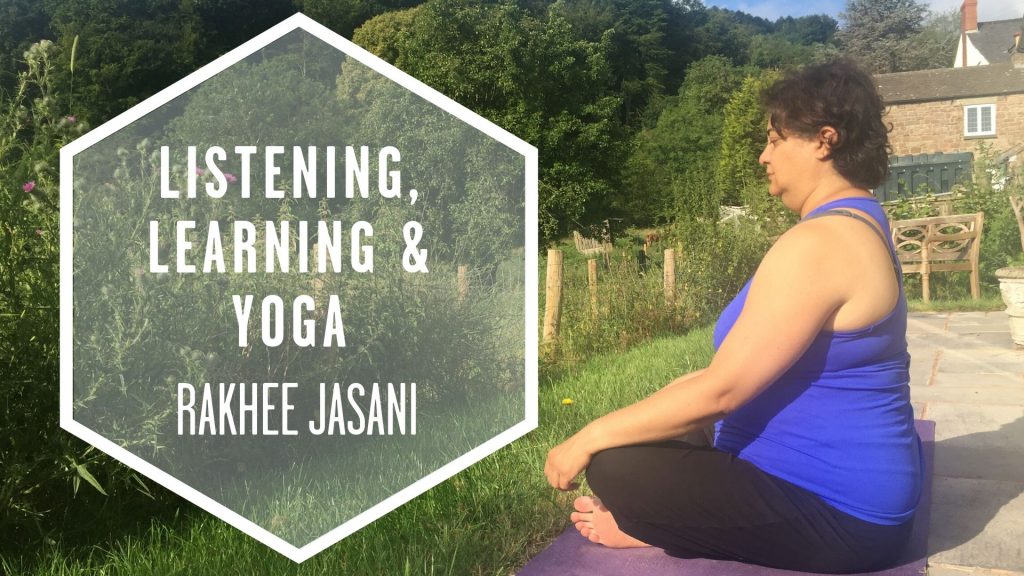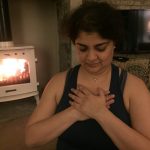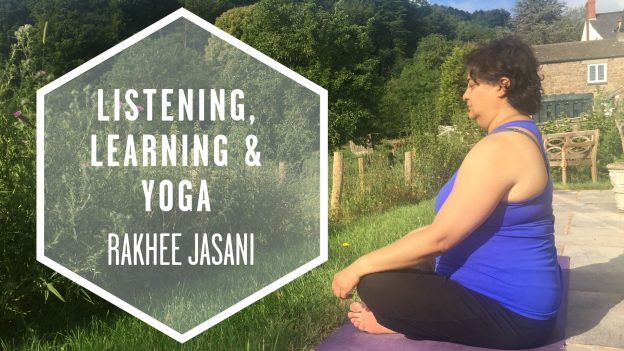
Rakhee Jasani reflects on her own experiences of racism and explores how listening and learning, the core tools of yoga, can support us on our journey to authentic allyship.
As the conversation about Black Lives Matters has rightly intensified over the past two weeks, I’ve been thinking about learning and listening and yoga. Last year, I wrote an article about how my face, or maybe it was my body, or was it perhaps my skin tone didn’t seem to fit in the pervading culture of the yoga studio. The article created a bit of a stir – well for me anyway. I’m not used to really being noticed, perhaps for the reasons listed above and also because as a people-pleaser I don’t always like to bring attention to well things that are confrontational. Anyway, back to the stir – the article was shared umpteen times, there was some hand-wringing, some praise, some people reached out with moving anecdotes, and then… well then, there was nothing. There was no change. No action took place.
Skin-Deep is no longer enough. Who wields the power?
Yoga studios continued to peddle blonde, bendy, 20-something ‘white-body supremacy’ (a term coined by Resmaa Menakem); green smoothies, oms and namastes; a waft of incense and the power firmly where it always was. The studios were not filled with black and asian people, or people of colour of every hue; nor were the teacher training faculties, nor the management of studios.
So we come to now and we come to a moment when it feels that just perhaps we can dare to dream; that just perhaps things might change. The thing is, and I’ve seen it, many people think it is enough to stick some black or brown faces onto publicity. But do the yoga studio schedules reflect this? And even more pertinently who has the power? I experience this frequently. I see the hand-wringing, I hear the ‘we love your classes, but will people come?” Well, maybe try educating them, or maybe try marketing this class more widely to people it might benefit and who might come.
But the journey is long. If we don’t pause to listen, and learn, to seek nourishment and to build resilience and march on. How is it that we will see the change we yearn for?
Who do you think you are?
Before I continue, I just want to clear up a few things. I am from an Indian background, but I wasn’t born, nor raised in India. My grandparents moved to Kenya which is where my father and subsequently I was born. I was educated in Britain. I therefore can speak of that. As a person of colour, I have certainly had experiences of racism; and sometimes so covert, that I question myself, but the one thing I don’t have is experience of navigating life in Britain as a black person. This might seem a trivial point, but I think it is important for historical reasons and finally, because I am writing about yoga and I think that may also colour (intentional use of word) my perspective.
Finally, I am offering my perspective and opinion as a yoga practitioner and a yoga teacher. In this case I’m referring to modern postural yoga although my understanding and teaching of yoga is influenced by my reading of yoga philosophy and by my upbringing. This is not an academic article, but one which I hope inspires us to learn together.
Learning and yoga
Self-study or self-enquiry is central to yoga. In the yoga sutras of Patanjali, svadhyaya which is frequently translated as self-study or investigation. Namely this means who we are and questioning our relationship with the world and in the current context, I believe this extends to questioning how we relate to others. What lens are we seeing the world through? What are our unconscious biases? And what are we doing to educate ourselves? In the sutras self-education is coupled with discipline and so I challenge us all to open our minds and set ourselves with kindness to learning more!
Listening and yoga
In ‘the foreword to ‘The Mirror of Yoga’ Richard Freeman writes ‘Yoga begins with listening. When we listen we are giving space to what is.” At this time, I believe that this is more important than ever. We need to commit to the discipline of learning and listening and then we need to ‘listen’ to how what we are learning and reading and hearing sits in our body. I quoted Resmaa Menakem earlier. I would urge you to listen to him talking about the relationship between our bodies and racialised trauma. Once we understand how we are feeling we can move.
Making choices & Taking action
One of the definitions of yoga is ‘skill in action’ which comes from The Bhagavad Gita. And making the right choice and taking action, lies in our hands. It is no longer enough to offer thoughts and prayers, to wear trinkets and declare yourself a yoga practitioner. I asked at the end of my first article, for readers to question what it is they are practicing, and how deep their pursuit of equality goes? Does it penetrate the structures of the institutions we revere or reflect who we choose to celebrate? I am still asking that. And, yes, great to see so much talk and debate. I’m withholding any whoops of achievement until I actually experience the change, when I stop second-guessing why I’ve been passed over one more time.
This is the first of a series of articles I’m planning to write on this topic. I’d love you to comment below with your thoughts on learning and listening, and how through taking this step we can begin to change ourselves and our world.
Further Resources
There are many resources available but I wanted to mention Resmaa Menakem’s book My Grandmother’s Hands: Racialized Trauma and the Pathway to Mending Our Hearts and Bodies and Michelle Cassandra Johnson’s Skill in Action: Radicalizing Your Yoga Practice to Create a Just World.
About Rakhee Jasani:

Rakhee Jasani is MFML’s Wordsmith Maven. If you’re inspired to try her classes after reading this article, she is currently teaching Live classes for MFML. As a child, Rakhee always had her nose in a book, so it’s little surprise that she now tames words. As she grew up she found that it was equally fun to spend time in her body as well as her mind. Rakhee edits the MFML blogs and writes and curates the courses and challenges. Before MFML, Rakhee co-founded and ran a youth arts charity which she left after 24 years to write about and teach yoga. Rakhee completed her training (200 hrs) at Yoga on the Lane with Naomi Annand and MFML’s Adam Hocke and she has also completed Mimi Kuo-Deemer’s Qigong for Yoga Teachers immersion. Rakhee loves to move just about everywhere.





Thanks so much for this article Rakhee and for sharing your story and these resources.
I love that Richard Freeman quote, I come back to it again and again. I have just bought Layla F. Saad’s book Me and White Supremacy, which includes journal prompts to actively look at how privilege and racism show up in yourself and your life. I think this will be really helpful for the self-study aspect you’ve talked about here.
Looking forward to reading more of your articles in this series!
Thanks Aimee. I’ve also recently bought Layla F. Salad’s book. I’m looking forward to the journey and hearing about yours.
Rakhee – I’ve just seen that Michelle Johnson has a workbook. Would you and / or Kat be interested in a MFML study group / book group / do the work accountability group? In one of her posts (after been pulled over by the police – I’ve pasted the link below) she said ‘to the yogis, the compassionate ones or spiritual practitioners who believe we can love and light this shit away – you’re not practicing yoga’. That really resonated for me. https://www.michellecjohnson.com/blog/2019/9/16/bw3of38j79k6s2r8svnl5konavsb0e. I’ve ordered Skill in Action and the workbook.
Hi Pat
Thanks for your comment. We’re planning to possibly run a book club soon and this would definitely be a possibility and a good starting place. I’ll have a chat with Kat about this. Thanks for your suggestion.
Rakhee
That would be really interesting Rakhee – definitely keep me posted! I’ll let you know when I get the books – they’re shipping once or twice a month and don’t have UK shipping rates on Michelle’s website. Thanks for looking into this, Pat
Thank you Rakhee for sharing your experiences with such humility, generosity and skill. learning and listening is so key at the moment. As a 56-year-old Latina, I want to see more teachers of colour, ethnic minorities – with wrinkles, life-experience and comfortable bodies. Great piece! ❤️
Thanks Julia.
A heartfelt thank you Rakhee for this article and for sharing your experiences. The resources are really helpful too for truly listening and learning. ❤️🙏
Thank you Rakhee for your wise and true words as ever. I hear you and hope that true yoga can lead to deep listening and wise action and a positive move forward. Much love xx
Thank you Anna for your words and also your work in enabling people to listen deeply.
This was such a beautiful read! Yoga is truly a lifelong journey of listening—to our bodies, our breath, and our inner wisdom. The way it teaches patience, self-awareness, and continuous learning is what makes the practice so transformative. Thank you for sharing this inspiring perspective!